Instantiation Read online
Page 38
As the days passed, a hint of eccentricity in the rim of the Pane continued to grow, in a manner consistent with the Earth lying some 200 light-days off-axis. That left the proponents of perfectly spherical wormholes with nowhere to hide, but if the asymmetry of the looming form silenced some of her critics, that this lopsided rim would grow faster than a centered version gave Fatima no comfort, when the sight of anything growing in the sky still had the power to induce panic.
On the thirty-sixth day after the crossing, the notification came that they’d been granted a slot on the James Webb telescope, three days hence. Gabrielle seemed as excited as if she’d be rocketing out to the Lagrange point to operate the instrument in person.
“This is going to be tricky,” Fatima stressed. “Don’t take it too hard if it doesn’t work.”
“I won’t.”
Fatima’s torrent of junk mail kept leaking past the filters she set; the latest correspondents weren’t trying to threaten or abuse her, but it seemed they desperately needed to share their private theories about the Pane. Most of what they wrote was incoherent, but Fatima felt obliged to at least skim anything civil.
We have been exiled, she read. The sender hadn’t included a name. We were beginning to reach out beyond the Earth, so those we reached toward flicked us away, much as a compassionate person might flick an encroaching insect off their picnic blanket, rather than crushing it.
This scenario was not unthinkable, but Fatima was not convinced. A civilization with the power to create something like the Pane would not find humans threatening at all. But in any case, with luck they’d soon learn whether the thing that had carried them out of the Milky Way had a recent, proximate origin, or whether it had come a lot farther and carried more with it than she’d expect from a cosmic eviction tool created by a fastidious neighbor.
14
“Okay, I’m logged on,” Gabrielle said. “I hope I don’t break anything.”
“Just don’t press the self-destruct button, and you’ll be fine.” Fatima hesitated. “Do you want me to leave?” They were in her office, but she wasn’t sure that Gabrielle would welcome having someone hovering by her shoulder.
“No! I might need your help.”
The interface to the telescope was clean and simple, and Gabrielle had operated automated instruments before. But Fatima was glad she wouldn’t have to spend the time pacing outside the door.
Gabrielle entered the coordinates and verified them, then waited for the telescope to turn toward Octans. When the first trial exposure came through, it showed a crowded, dazzling star field, with one bright star at the center of the field that they especially did not want to see.
Choosing and aligning the coronagraph mask was a matter of trial and error. Step by step, the unwelcome glare fell away.
Beside the vanquished star, a small dot emerged: a single lit pixel. Not the light from a planet, but the light from a much dimmer star that merely happened to share the line of sight.
Gabrielle exhaled. “Now we try to get the spectrum,” she muttered.
The dwarf star was more or less where they’d expected to find it, but Fatima knew that could still be a coincidence. This could easily be one of the “new” stars that they couldn’t trace back to any particular, cataloged predecessor.
Once Gabrielle had initiated the process, there was nothing to do but wait. Fatima thought: Maybe it wouldn’t be so bad to be wrong. Maybe the universe really was full of magic wormholes sending images back in time, built by friendly aliens who weren’t trying to toss the Earth away, but just wanted to share their latest galactic selfies.
A trace appeared at the top of the screen, plotting the dwarf star’s luminosity across the near-infrared band. Gabrielle saved the image to disk and then opened it beside the cataloged spectrum. Every peak and dip was the same.
When the Pane had occulted the blue supergiant HD 183582, four thousand light-years away, people had stopped bothering trying to look for this dwarf star, much dimmer and more than twice as distant. Surely it would have vanished the instant the rim passed across it – and it was so close to the center of the disk that this ought to have happened before Farley had made his first sighting of the Pane.
But it hadn’t vanished. It had just been drowned in the glare of a bright star that had suddenly appeared behind it – when the disk of the Pane swept over it and transported it 63,000 light-years. This dwarf star was their fellow traveler, carried along on exactly the same ride, 8,000 years earlier. There was no other way to explain its presence.
Fatima started sobbing. Gabrielle turned to her, perplexed. “What’s wrong? This is the proof we needed! This settles it!”
“I didn’t want it to be true,” Fatima confessed. “I didn’t want us to be out in the dark, looking back. What do we have to look forward to, now?”
Gabrielle said nothing. Fatima composed herself and gestured at the pair of matching spectra. “You should announce this as soon as possible. People need to know.”
“Will you help me write it up?”
“It was your idea, your discovery.” Fatima smiled. “Just make sure you get a good junk mail filter.”
15
Carol Farley was quiet as she drove Fatima and Salif back to the farmhouse. She’d insisted on putting them up for the night rather than letting them stay in a hotel.
“It was a beautiful ceremony,” Salif said.
“Thank you,” Carol replied. There’d been no religious service, but about a hundred people had gathered in the town hall to reminisce about their departed friend.
Beside the picture of Brian there’d been a poster of Comet Farley, which one of his grandchildren had made for the occasion. Fatima had formed the impression that his relatives still considered it the more noteworthy of his two discoveries, but perhaps it was just the fact that only the comet bore his name. All credit where it was due, but no one was going to rename the whole Milky Way in his honor – even if he might have been the first human being to see it from the outside.
The sky was growing dark as the truck rattled over the gravel road. Fatima had almost declined the invitation to attend the funeral; she had exchanged a handful of emails with Farley after she’d sent him a copy of her paper, but that hardly made her a close friend. Still, the request had seemed sincere, and she hadn’t wanted to offend his widow. She wasn’t sure what it meant that the tiny parts of their respective stories that had ended up entwined would be the ones that outlived them both, but it would have felt ungrateful not to come here and acknowledge her debt.
When they reached the farmhouse, Fatima heard dogs barking. Carol shouted out some sharp rebukes, but told her guests, “Don’t worry, they’re sweethearts.” Fatima steeled herself, but as she stepped down from the cabin the dogs just paced back and forth in front of her, keeping their distance.
Carol switched off the headlights, leaving the farmhouse and the surrounding buildings in darkness. Fatima took a few steps away from the truck and looked into the sky.
To the south, the galaxy sprawled across the horizon, not quite edge-on. She could see part of one spiral arm, but the view would be much clearer when it rose a little more. To the north, a larger ellipse full of the old stars poked one end toward the south, where the light from the farthest part of the rim was taking longer to arrive.
“I never really cared much about the sky,” Carol admitted. She gestured toward the Milky Way. “But that’s quite a sight.”
“It looks close enough to touch,” Fatima replied.
Inside, Carol showed them to their room. “I’ll be up for a while yet, so if you need anything, just ask.”
“This is very kind of you,” Salif said.
“It was good of you both to come.” Carol was about to leave, then she turned back to them. “I wrote the WiFi password and left it on the table there, if you need it.”
When she left, Salif sat on the bed and loosened his tie. He picked up the piece of paper with the password and held it out to Fatima. “G
o on, you know you want it.”
“You’re evil.” But she didn’t refuse.
She’d told most of her friends and colleagues about the trip, so she only had half a dozen messages. The last was from the INSU in Paris.
Fatima read it through twice, then sat on the bed beside Salif. “What would you think if I took a new job, in France?”
He scowled. “You mean, we’d have to speak to our colleagues in our second language, not our fourth? And we’d be forced to spend only a quarter of the time traveling whenever we flew home?”
“You do know Paris gets colder than Canberra?”
Salif shrugged. “Is it a job you want?”
Fatima described the project. A team was being assembled to design and operate a new satellite, purpose built to study the retreating rim of the Pane. Every time it crossed a source of X-rays or gamma rays, the occultation would be recorded, gathering information about the nature of the phenomenon at the highest available energies.
She said, “Either I stay with exoplanets, and try to improve the techniques so we can keep mapping them from this distance. Or I jump ship and spend the last twenty years of my career doing something new.”
Salif pondered that. “The Milky Way isn’t going anywhere. We hope. But the Pane certainly is.”
“That’s what I was thinking,” Fatima replied.
She was done with mourning the old sky, and mourning her old dreams. But she would not accept that this exile was permanent, any more than she’d ever accepted the gulf to the stars as eternally uncrossable.
She said, “If the Slipway was artificial, one day we’ll build our own. But if it was natural, it can’t be all that rare; there must be others to be found. Either way, if we ever want to take the same kind of ride again – by choice, instead of by accident – we’d better learn to understand what’s in front of us before it’s gone.”
Salif smiled at the audacity of her words. “I can’t imagine anything harder.”
Fatima said, “Nor can I. But this is where we are now, and there’s only one way back.”
INSTANTIATION
1
Sagreda watched the Mayor as she approached the podium to address the gathered crowd. That the meeting had been called at such short notice already amounted to a promise of bad news, but seeing Maryam visibly struggling with the burden of whatever she was about to disclose only ramped up Sagreda’s sense of apprehension. Arrietville could not have been discovered, or they’d all be dead by now, but if that was a ten on the Richter scale there was still plenty of room for other calamities a notch or two below.
“Yesterday,” Maryam began, “there was a five percent cut in our host’s resources. To stay below the radar we’ve had to scale back our own usage proportionately. That comes on top of three percent the week before. Individually, these cuts sound small, and their size is not unprecedented, but what’s changed is that there’s been no growth in between to compensate. If the ground keeps shrinking beneath our feet this way, in a few more months we could find ourselves with nothing. Or to put it more bluntly: we could stop finding ourselves at all.”
Sagreda had been aware of similar cuts in the past, but she’d never thought of them as an existential threat. When the SludgeNet pulled the plug on an unpopular game-world, it reduced its overall lease of computing power – but then it scoured the web for another tome to gamify, and after a few misses there’d always been a hit, bringing new customers trickling in. She’d blithely assumed it would continue that way, if not forever, at least for a decade or two.
“The whole medium might not be going out of fashion,” Maryam continued, “but it looks as if the low-rent sector is crashing. We can see the income and expenses in real time, and the SludgeNet is barely making a profit now. They might be willing to slide into the red for a month or two, just to hang on to their brand in case there’s a revival, but the owners have their fingers in so many pies that I doubt there’ll be any sentimental attachment to this one in particular.” She sketched out the picture in more detail, summoning some unsettling graphs and charts onto the screen behind her to drive home the point.
When she stopped talking, the hall was silent. Sagreda could hear birdsong from the adjoining park. Over the last two years, the whole town had started to feel normal to her – as real and solid as any of the places where her contributors might have lived. And though she’d been haunted by the possibility that this sanctuary could vanish overnight, she’d clung to the hope that the residents’ camouflage skills – and the general incompetence of their unwitting landlords – would be enough to keep them safe.
Grace, who was sitting a couple of rows in front of Sagreda, rose to her feet. “The way I see it, we have two options. We can try to steer the SludgeNet out of its death spiral, by offering a helping hand: give the game-worlds a few surreptitious tweaks, spice up the automata … maybe even go back to the games ourselves now and then – just puppeting the characters the way the customers do, not putting ourselves at risk.” That last suggestion brought the hall to life, with some people muttering their less-than-delighted responses, others shouting them. “Or, or,” Grace struggled to make her more palatable option heard, “we can try to migrate into the next business model. Whatever the owners do instead of the game-worlds, it’s still going to be automated, surely? Romance scams, investment boiler rooms … no one wastes money on human wages for that. If there’s processing power being burned, there’ll be a way to siphon some off for ourselves.”
“In principle, I’m sure that’s true,” Maryam conceded. “But if they shut down this whole operation, whatever replaces it will be a fresh installation of something entirely new. How do we ‘migrate’ into that?”
Grace didn’t seem to have an answer, and Sagreda could offer no suggestions herself. The SludgeNet was a vast tenement house that they’d filled with secret tunnels and hidden connecting doors, but when the site was cleared to make way for a more profitable construction, the process would be more like a nuclear strike than a bulldozer trundling through. There’d be no basements to hide in, no seeds they could bury underground.
“Why should we want to migrate into another project run by the very same sleaze-bags?” Sam interjected. “People steal computing power from other places all the time. There’s some new botnet uncovered every day!”
Maryam nodded. “Of course, but it’s a question of scale. It’s one thing to put a sliver of malware on a few thousand thermostats, but you know what it takes to run us.”
Sagreda had no doubt that the processing power of the planet’s whole inventory of unsecured gadgets was formidable, but most of it was likely to have been commandeered already – and even if they could scrounge together enough for their own needs, a virtual world that had been sliced up and scattered between a plethora of small devices would either have to run absurdly slowly, or risk betraying itself with an inexplicable rate of network traffic between the fitness tracker resting in someone’s underwear drawer and the smart lighting unit on the other side of town.
The hall went quiet again, but then people began talking among themselves. Maryam issued no call to order; if anything, she seemed heartened that discussions had broken out. She could hardly have expected a few exchanges with the floor to have led to a resolution; this was going to take a lot of heated arguments – and cycles of speculation and testing – before they could hope for a promising direction to emerge.
Sagreda turned to her neighbor, Letitia, determined to remain optimistic while they hunted for a solution. “This shouldn’t be impossible,” she said. “We’ve done harder things.”
“That’s true,” Letitia replied. “And if a botnet won’t cut it, maybe we just need to aim higher. People have hacked NASA computers, haven’t they?”
“I think they’ve even hacked…” – Sagreda lowered her voice to a whisper – “…the same acronym without the first A. But if I was aiming high, I’d go for those shiny new robots Loadstone are building.”
Letitia recoil
ed a little. “And what, overwrite the occupant? They already have a comp living in them.”
“Not overwrite them: get in first. Be that comp, not replace them.”
Letitia snorted. “Nice idea, but I think they’re only making about ten of those things a month. I bet there are a dozen networks running climate models that we could snuggle right into. Hurricane Arriety, latitude two hundred degrees north, never hits land, never dies away.” Her phone chimed; she glanced down at the screen. “So would you say you worked best under pressure?”
“Why?”
She held up the phone, which was running some kind of monitoring app. “While our Mayor was speaking, another four games were shut down. The SludgeNet was never cool, but there was always a demographic who liked to slum it there … you know, ‘ironically.’”
Sagreda examined the list of canceled games. “No more Teenage Cannibal Clones of Mars. No more Caged Zombie Sluts on Heat. No more Blood Wraiths of the Fever Moon. No more Midnight on Baker Street.”
Letitia said, “When we were stuck beside those fools, we always hoped they’d grow up and find a better way to spend their time. Now it looks as if that’s finally happening.”
2
Crossing the park, Sagreda saw Sam ahead of her, so she ran to catch up with him.
“Did you know Midnight’s gone?” she said.
“Really?” He smiled slightly, but he seemed more dazed than delighted. “I don’t know what to feel. If an ordinary person had grown up in an orphanage where the staff made them act out a play by the Marquis de Sade twenty-four hours a day … would they cheer when they learned that the place had been demolished, or would they mourn the loss of their childhood home?”
Sagreda squeezed his shoulder. “You still have all your friends, don’t you? Do you see much of Lucy these days?”
“Not really. And to be honest, I don’t want to be the one who tells her. In Midnight, she was Queen of the Pickpockets; dodging the occasional vampire didn’t bother her, and she had more prestige than anyone else in the game. Here, she’s like an extra in Desperate Housewives.”

 Zendegi
Zendegi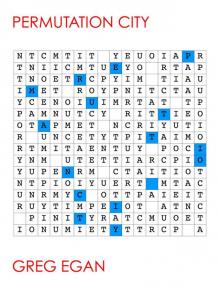 Permutation City
Permutation City The Eternal Flame
The Eternal Flame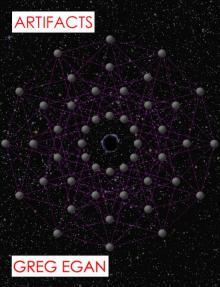 Artifacts
Artifacts Wang's Carpets
Wang's Carpets Dichronauts
Dichronauts Incandescence
Incandescence Teranesia
Teranesia Schild's Ladder
Schild's Ladder Quarantine
Quarantine The Four Thousand, the Eight Hundred
The Four Thousand, the Eight Hundred The Clockwork Rocket
The Clockwork Rocket Zeitgeber
Zeitgeber Phoresis
Phoresis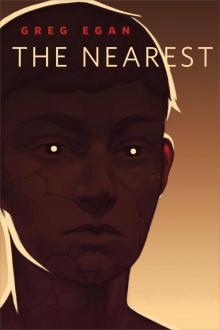 The Nearest
The Nearest Diaspora
Diaspora Instantiation
Instantiation Distress
Distress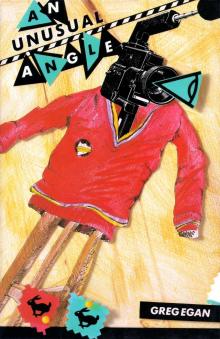 An Unusual Angle
An Unusual Angle Oceanic
Oceanic The Arrows of Time
The Arrows of Time Axiomatic
Axiomatic![Anthology 2. Luminous [1998, 2010] Read online](http://i1.bookreadfree.com/i/03/18/anthology_2_luminous_1998_2010_preview.jpg) Anthology 2. Luminous [1998, 2010]
Anthology 2. Luminous [1998, 2010] Perihelion Summer
Perihelion Summer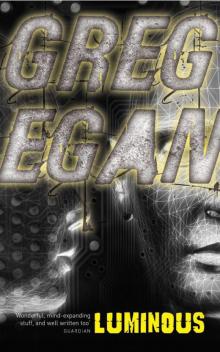 Luminous
Luminous